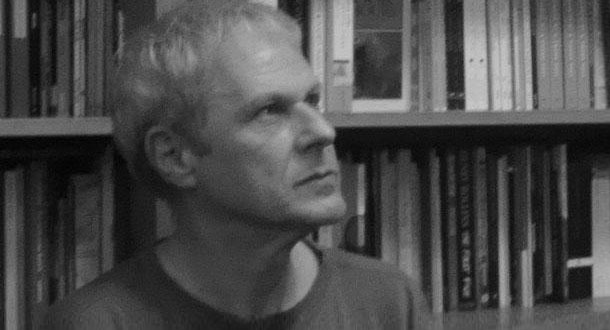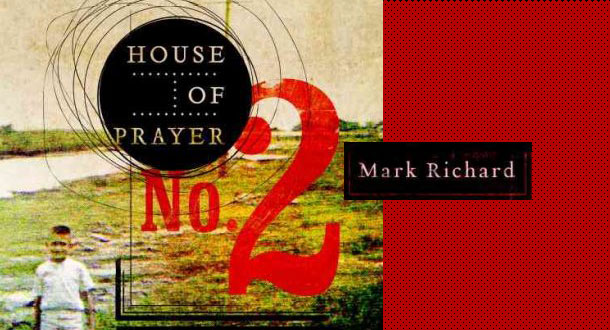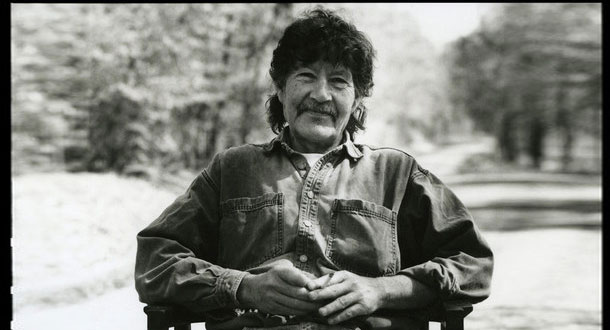The first book I read by Scott Adlerberg was this little novella titled Jungle Horses. It was like nothing I’d ever read before. It carried this unique, surreal atmosphere that I immediately fell in love with. So when Adlerberg asked me if I was interested in an ARC of his newest novel, Graveyard Love, there was no way in hell I could pass up on the opportunity. I devoured the novel immediately. Somehow, it was even better than Jungle Horses.
Today, Adlerberg was kind enough to stop by LitReactor and answer a few questions.
Back in October, you were briefly a celebrity on Reddit after a photo was posted of you and your son reading on the subway. The photo received over a million views. Can you walk us through that day? Was your son aware of it? Why is the Internet so goddamn weird?
What a day that was. That day I was on the subway taking my son, who’s 10, to school and I checked my phone underground at a stop where you can get reception, and I see I’ve been tagged in a post the crime writer Chris Irvin did after someone alerted him to the picture. Chris’ friend alerted him because I’m reading an ARC of his book Safe Inside the Violence in the photo. In his post, Chris was asking “What? Huh?” Then the train moved again and I couldn’t check Facebook because reception went out. When my son and I got out of the subway at the stop near his school, we still had to walk four blocks to get there and the main thing is to get there on time, so I’m walking the whole time wondering what the hell that post was I just saw and I can’t really stop to check Facebook. Finally, after I dropped my son off, I stopped on the sidewalk and took out my phone. First thing I see: a text message from a good friend of mine saying, “You realize you’ve gone viral on Reddit?” Eight thirty in the morning, standing out on the sidewalk with my phone, I have to get back on the subway to head downtown in Manhattan to get to work, and I start to piece together that this photo was taken and it’s getting all these hits and comments on Reddit.
“Apparently, I’ve gone viral on Reddit,” I posted on FB, showing the photo in question, and from there it just took off. Have to say, writer friends and non-writer friends, people who actually know me, read the photo in the sanest possible way. Somebody, for whatever reason, thought that a shot of a kid and his father, with the kid leaning his head on the father’s shoulder as they both read actual books, somebody thought that a sweet or cute picture. Interesting enough to be worthy of a photo? Don’t see why, but if the photographer thought so, fine. But I just don’t think there was a malicious motive there. As the day went on, however, it got pretty strange because I was reading the Reddit comments about the photo and I had trouble believing the interpretations people had about the photo. Interpretations about the photographer’s motives for taking the picture. Speculations of all sorts about a father and son, black father and son dare I say, reading together on a subway and all the implications of that. (Do blacks read? How great to see a black father who hangs out with his son. But why do they read regular books and not from e-readers? Could it be because they can’t afford e-readers?) It was absurd. A Rorschach test of a million people reading into what they see in a particular photo of a father and son of a certain background reading on a train. Absolutely ridiculous. I told my son about us going viral, without getting into the uglier details and nonsense, and he was totally puzzled. Why would someone take a picture of something we do all the time, and why would a lot of people have something to say about it? That was his basic attitude, and I couldn’t disagree with him.
Tell us about the first piece of writing you ever sold. Did you celebrate?
The first thing I ever sold was a collection of short stories. The Hunting Heart, it’s called, published by a tiny press in 1988. I’m pretty sure the press folded several years ago. The stories were mainly horror and weird tales, and none of them had been published previously. I remember having a book party for it in the Bronx where I lived at the time. It was all friends and relatives who came but the turnout was good. It was a lot of fun.
I’ve read elsewhere that Jungle Horses and Graveyard Love were both written many years ago. You already covered the weird publishing history before Jungle Horses in a previous blog post, but was there any interesting background to Graveyard Love?
Nothing involving a scam artist publisher who wound up going to jail like with Jungle Horses or the novel before it, Spiders and Flies, but from start to finish Graveyard Love took a long time. Strictly my doing that it did take so long. A longer and different version was completed many years ago, but after I got some advice from a friend that I should cut it a good bit and totally restructure it, I let it sit for a long time. Barely looked at it and never touched it. This went on for years. It was partly a crime novel then, partly a kind of monologue about an underground man type character who’s bitter at the world. In my mind, while it sat in a drawer, I was on the verge of abandoning it so many times I lost count. But finally I figured out what to cut and what to keep and how to just make it a fast-moving crime novel that perhaps borders on horror, and once I had that thought in my mind, I returned to it. That was in 2013, and I had it finished by the end of 2014. So really the background behind Graveyard Love is just about perseverance with something, sticking with it.
One thing that may be is funny: Before J David Osborne accepted it for Broken River Books in early 2015, from the time I’d started it back in 1999 or so, only 3 or 4 people had ever read it. And those few people saw the early version. By the time I was done with it in 2014, I didn’t show it to anyone, gave it to no beta-readers or whatever, nothing. I’d told David about it and I was like, “He likes it and takes it or suggests changes to it for me to work on or I just dump it finally.” I wasn’t about to start going through the whole process of having people read it and give me advice and feedback and so forth. Needless to say, after all that time and that uncertain history, it’s been quite pleasant to have gotten the good responses to it I’ve been getting.
How long does it typically take you to finish a manuscript? Do you go through many drafts? How do you know when a book is finished and no longer requires revision?
 I’m a slow writer. I wish I wasn’t but I just am. But not everything, thankfully, takes as long as Graveyard Love did. The writing of Jungle Horses went smoothly from start to finish, though even that, a novella of about 25,000 words, took about 6 or 7 months as I remember. So a novel generally takes me anywhere from a year to two years. I do work full time, something to take into consideration. But still. Graveyard Love went from being one version to another, as I said, but generally I don’t do a first draft, then a second draft, then a third draft, like that. I’m the kind of writer who finds it very difficult to proceed if I feel there’s too much that needs to be corrected that I’ve already done. So I advance in fits and starts, always going back and re-writing, changing, editing, re-writing, till I feel what I have is adequate and I can advance some. When I reach the actual end of the book, it’s in pretty decent shape, though that’s when I go back and do more editing and revising till I feel it’s as good and well-written as I can make it. It’s hard to know when a book is finished and requires no more revision but my gauge is pretty much when I feel the changes I’m making are so miniscule that the gains to be made in the book are so small, it’s not worth tinkering any more. Or I’m revising so much that I’m squeezing all the life blood out of the book. That’s a danger. I do have trouble letting go of things I’ve worked on, that’s for sure. I mean, it seems there’s always something that can be improved in the writing. But you could tinker with something forever and not be satisfied. At some point, I say it’s as good as I can make it and I have to let it go.
I’m a slow writer. I wish I wasn’t but I just am. But not everything, thankfully, takes as long as Graveyard Love did. The writing of Jungle Horses went smoothly from start to finish, though even that, a novella of about 25,000 words, took about 6 or 7 months as I remember. So a novel generally takes me anywhere from a year to two years. I do work full time, something to take into consideration. But still. Graveyard Love went from being one version to another, as I said, but generally I don’t do a first draft, then a second draft, then a third draft, like that. I’m the kind of writer who finds it very difficult to proceed if I feel there’s too much that needs to be corrected that I’ve already done. So I advance in fits and starts, always going back and re-writing, changing, editing, re-writing, till I feel what I have is adequate and I can advance some. When I reach the actual end of the book, it’s in pretty decent shape, though that’s when I go back and do more editing and revising till I feel it’s as good and well-written as I can make it. It’s hard to know when a book is finished and requires no more revision but my gauge is pretty much when I feel the changes I’m making are so miniscule that the gains to be made in the book are so small, it’s not worth tinkering any more. Or I’m revising so much that I’m squeezing all the life blood out of the book. That’s a danger. I do have trouble letting go of things I’ve worked on, that’s for sure. I mean, it seems there’s always something that can be improved in the writing. But you could tinker with something forever and not be satisfied. At some point, I say it’s as good as I can make it and I have to let it go.
What’s your day job like? How do you juggle working full time with being a father and a writer?
I have a job working full time for a city agency in New York City. I manage a unit of about 16 people. Managing others can be a major pain in the ass and the job is hardly exciting, but as day jobs go, it’s okay. It does keep me busy and the days pass pretty quickly and best of all, though I’m often tired at the end of the day, I have absolutely nothing to take home at night. I work from between 9:00 and 10:00 am to between 5:00 and 6:00 PM and those hours hold true nearly every day. It’s extremely rare that something comes up keeping me at work later than expected.
Writing itself I fit in whenever I can. Sometimes immediately after work, sometimes late at night after dinner and after my son has gone to bed. Next year, when he starts middle school, the trip to his school in the morning, which takes a good hour now, should be much shorter. That means we’ll be able to leave the house an hour later each day, so I’m thinking I may start going to bed early each night so I can wake up very early and write before going to work. But the main thing now is, I’m flexible. I’ve always been pretty disciplined about writing on a regular basis, but now that free time is precious, I can switch on and off for writing quickly and do it any time of the day or night as long as I have the energy. With a full time job and a kid, there’s no other way to do it. And I’ve found the phone, the I-phone, to be a great help. I can write a couple of paragraphs after work in my office and then edit on the phone while on the subway ride home. So really it’s just a matter of getting by on as little sleep as I can take, writing in snippets whenever it’s possible, and over time, the pages build up. Not ideal, but unless you’re a full time writer who’s got “ideal” conditions for writing, you write when you can as best you can with the energy you have. I do find that if I can exercise a few times a week, running or using the bike machine we have at home, it helps keep my energy level up a lot. Along with coffee, coffee, and more coffee.
Your books tend to be genre blenders. I think perhaps worrying about staying inside one specific genre can be limiting to a writer, and judging by your own writing, I think you might agree. When approaching a new work, do you worry at all about what genre readers might label it?
No, I don’t. I think about it and consider it, but I don’t worry about it. You use your imagination to come up with an intriguing story and you hope that the story alone, regardless of the genre or blend of genres, grips the reader. We’ve discussed labeling before a little, and I’m with you in that I don’t think labeling stories and books adds anything. You call something a mystery or horror or sci-fi or western novel because it has certain elements and you have to call a book something to be able to communicate about it, but whether genre readers will like or dislike something because it mixes horror with mystery or fantasy with noir, no, you can’t dwell on that. Like with all writing, everything depends on how the work is done. If it’s well-done, more people than not will probably like it. There will always be people who like their detective novels a certain way and their horror a certain way, and there’s nothing you can do about that. People have their tastes. But there are plenty of readers who enjoy having a touch of the unexpected, the off-kilter, given to them. And I do agree, staying inside one genre can be limiting to a writer. Many writers do work within a genre or a number of genres without ever mixing them, and that’s fine, of course. Genres are so flexible they give writers a lot of room to use their imaginations. But your imagination goes where it goes, and if that means blending genres for the purpose of telling a compelling story, so be it. I will say I don’t think of blending genres just for the sake of blending them. Whatever blending there is has to be something that occurs naturally. It’s just the particular way of telling that story. But if your imagination is going that way for a story, you definitely go with it.
What’s the biggest mistake you’ve made as a writer?
Where to begin? If I had to pick the biggest, it’s trying to write prose that’s lyrical. Prose that’s lyrical and ornate and pretty. This is a long time ago. It took me awhile to get through my skull the importance of economy with language. Elegance is nice, but unless you have the gift, prose ain’t something that lends itself to lyricism. For me the elegance comes through precision, clarity, narrative speed. Those are the goals. I still remember something a professor I had in college told me about a story I’d written: “The story’s good but the language….Every noun you write comes attached to an adjective, like Saran Wrap.” A little harsh but he was right on the money. I try to keep things clear and forward moving and I’m always trying to trim and condense. I highly doubt I’ll ever write anything remotely resembling a long book. 80,000 words would be monumental for me.
Where do you prefer to purchase books? Do you have a particular favorite indie bookstore you’d like to put in the spotlight?
I still prefer to buy books at actual bookstores, and indie bookstores are definitely the first preference. In New York City, one particular favorite of mine is the Mysterious Bookshop, in lower Manhattan. It’s the last bookstore in New York - there used to be several - specializing in crime and thriller fiction. And for books of all sorts, fiction, non-fiction, everything, I love McNally Jackson Books. That’s also in Manhattan, in the Soho area.
Thank you for your time, Scott!

About the author
Max Booth III is the CEO of Ghoulish Books, the host of the GHOULISH and Dog Ears podcasts, the co-founder of the Ghoulish Book Festival, and the author of several spooky books, including Abnormal Statistics, Maggots Screaming!, Touch the Night, and others. He wrote both the novella and film versions of We Need to Do Something, which was released by IFC Midnight in 2021 and can currently be streamed on Hulu. He was raised in Northwest Indiana and now lives in San Antonio.

.jpg)




